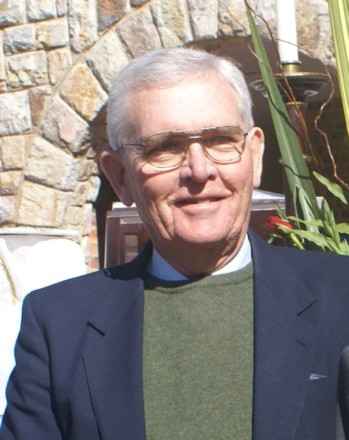
Professor Bob Charlton was born in Johannesburg on 27 January 1929 and attended school there at St John's College. Professor Charlton came from an academic and medical background – both his father and his mother were doctors, and his maternal grandfather was a mathematician at the University of Stellenbosch. Indeed he was passionate about medicine, education and teaching all his life.
Professor Charlton's long association with the University of Witwatersrand began in 1946 when he registered as an undergraduate medical student, graduating with a M.B., CH.B. In 1953, Professor Charlton joined the Professional Medical Unit at the Johannesburg General Hospital as an intern. Professor Tom Bothwell was then the registrar in this very busy unit, and they developed a deep and lasting friendship, and professional association.
Following his internships, Professor Charlton's career course took an odd but short little detour when he was sent by the Chamber of Mines to Europe to assess candidate miners for recruitment. After several years of medical training in Edinburgh, Professor Charlton returned to the Department of Medicine at the Johannesburg General Hospital as a registrar.
Professor Charlton went on to become a physician in the Department of Medicine. He was a gifted bedside doctor and a good, if somewhat intimidating, teacher who will be vividly remembered by thousands of students he taught. He also showed a real aptitude for research and he joined in the work of Professor Bothwell's MRC unit which was studying iron metabolism and together they undertook research over a number of years. Indeed, the partnership continued long after Professor Charlton left the department. In all, Professor Charlton was author or co-author of more than 100 scientific articles, including (with Professor Bothwell) a definitive book, ‘Iron Metabolism in Man’ which has since been quoted in more than 1,100 scientific articles worldwide.
Professor Charlton was appointed as Professor of Experimental and Clinical Pharmacology in 1967 and headed up the Department of Clinical Pharmacology at the Wits Medical School. After a few years he was invited to join the administrative side of the University of Witwatersrand where he rose rapidly up the administrative ladder. In 1975 he was elected as a Senate representative on the University Council while serving as Assistant Dean of the Medical School. In 1978, he was elected Dean and served in that capacity until his appointment as Deputy Vice-Chancellor in 1980, all the while maintaining a Thursday morning ward round at the Johannesburg General Hospital for as long as he could – basically until the administrative demands of the University of Witwatersrand meant that he could no longer give it the attention it deserved.
His career culminated in his appointment as Vice Chancellor in 1988, a post he was to occupy with distinction for 10 long and daunting years. His period of office straddled the ‘old’ and the ‘new’ South Africa and he oversaw the turbulent, transition years with a steady hand addressing demanding issues with integrity, quiet courage and wisdom, while always insisting on the right of everyone to be heard. Professor Charlton felt privileged to have had the opportunities that he had and especially to have been associated with the University of Witwatersrand which he regarded as a great South African institution and of which he was a proud and passionate defender and advocate.
During his career as an academic and university administrator Professor Charlton served on several local and national bodies. These included the Medicines Control Council, the South African Medical and Dental Council, the Johannesburg Hospital Board, the Coronation Nursing College Council, the Witwatersrand Technikon Council and the Johannesburg College of Education Council. He was elected to Fellowship of the Royal Society of South Africa in 1991. Professor Charlton also served with dedication on the Board of Governors of the Wits Foundation, and separately on the Boards of Governors of a number of independent schools including St John's College. He was invited to be a Trustee of the Wits Foundation in 1987 and was reappointed in 1997. He served voluntarily in this position until 2008. In 2009, after turning 80, Professor Charlton resigned from the many boards he served on, commenting in his dry manner that during his career he had had to put up with too many board members who should have retired long ago to inflict himself similarly on others.
Professor Charlton had a wide-ranging intellectual curiosity and many and varied interests outside of work including wildlife, classical music (he was a season ticketholder of the Johannesburg Symphony Orchestra, sang in the Bach choir, and played the piano), crossword puzzles, and bridge plus a wide range of reading. He was also remarkably active after retirement; against a background of schoolboy and university rugby and squash, he was still shooting scores in the nineties at golf in his later years, and remained an active and skilled trout fly fisherman.
Professor Charlton died peacefully at the Morningside Clinic in Johannesburg after a sudden illness. To the last he remained the sharpest of minds. His wife Margaret passed away some years ago and he is survived by his three daughters, Sarah, Julia and Diana, and his son, Robert, and four grandchildren.
